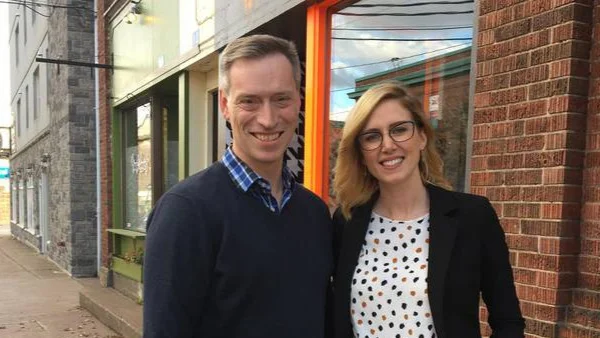Discussions with the Re-Design Lab at Harvard Graduate School of Education
Sackville Schools 2020 has a new partner in Paul Reville, professor of Practice of Educational Policy and Administration at the Harvard Graduate School of Education. Reville has many years of experience as an educational administrator and we are pleased to have him share his insights with the Sackville community.
It’s easy to be skeptical about changing the way we run our public schools here in NB, because there have been so many reform efforts over the years. With each new reform comes a new magic formula claiming to have the answers. And yet, very limited positive results are seen. We tend to rely on the politicians to come up with the solutions, leaving teachers, students and community members on the sidelines.
That is why we have been so pleased to hear from Reville and his colleagues at the Education Re-Design Lab at Harvard University. Members of the Re-Design Lab have been in discussions with Sackville Schools 2020 because we share the same conviction – that the onus for educational change is not just on the school districts and the politicians, it’s on the community.
More information on the Education Re-Design Lab: http://edredesign.org/
As part of their By All Means program, the Re-Design Lab works with towns and cities by approaching learning as a community endeavor. They call upon community groups, youth groups, the hospital, the university, sports groups and others to step up and help kids get the resources they need to be successful in school. They also look at the spaces where children learn and they see the larger community as the appropriate scale for integrated approaches to learning.
No wonder we have been so inspired by their work!
By All Means sees real opportunities for change in smaller, rural communities like Sackville.
Members of the Sackville Schools 2020 group hope to visit the Re-Design Lab later this month. In the meantime, Paul Reville has given us permission to reprint a blog post that he wrote on August 3, 2017. He tells us that he’s intrigued by what we are doing and envisioning here in Sackville, and admires the integrated community education initiative.
Many thanks for sharing your ideas with us Paul!
Redesigning and Aligning
A systems-level, community-based approach to education reform — so that every child can succeed
Paul Reville, Harvard Graduate School of Education, August 3, 2017
What does it take to prepare all children to come to school ready to learn? To answer this question, we’ve been thinking about how radically children’s lives differ outside of school, and what it would take to provide individualized support and learning so they can all succeed.
We’re envisioning an education system — not a new system, but one that’s built on our current system — of supports and opportunities that meets all children where they are in early childhood, and gives them what they need inside and outside of school so they can be successful in every stage of education and into adulthood. In our vision for a redesigned education system, we know that we can’t expect schools alone to shoulder this responsibility. Instead, we have to align all of our public services so that they work together, in partnership, to support families and promote the success of every child.
To make educational equity systemic and enduring, we must do more than engage our schools; we must redesign, align, and integrate all the community services that support children and families.
“To make educational equity systemic and enduring, we must do more than engage our schools; we must redesign, align, and integrate all the community services that support children and families — our health departments, our recreation departments, our social services agencies. ”
We’re working on solutions here in the United States, exploring the possibilities of system redesign in six cities and one state. And we’re also looking at international models, to see how other systems of education are approaching the same questions. The examples from a recent report by Amelia Petersonhelp us see what works globally; they show us, once more, that we cannot focus on schools alone to provide the solutions we need.
This global work brings up a series of new questions and ideas about education:
- Who should be the leaders in education, and how do we foster those leaders?
We shouldn’t just think about the work of managing schools or classrooms — it’s a broader type of community leadership. We need people capable of crossing boundaries, who understand the needs of children and the politics of a community, and who can build systems integrating different sectors. Right now, our universities are not necessarily producing leaders with the skills needed to do this kind of work. Moving forward, we need to develop interdisciplinary programs to nurture and sustain such leaders.
- Can we change current paradigms of equity?
Current systems favor the advantaged and hinder the disadvantaged. Our idea of meeting students where they are flips that model. For example, when a student enters kindergarten having heard millions of words fewer than her peers, we have to provide that student with instruction and other learning opportunities to close that gap. Making such changes — doing this system-building work — is both technical and political in nature. It’s publicly providing opportunities for some children that others receive from their high-social-capital families. We need to embrace this new paradigm of providing to each child what he or she needs, inside and outside of school, in order to be successful. But we also have to ask whether we can sustain that work in the face of political change.
- How do we measure success?
What does it look like, and what are its indicators? In the United States, many are not satisfied with our current indicators, which are test scores in ELA, math, and science. So what else could our markers be? International programs not only have different markers, they also demonstrate new ways of promoting a more holistic conception of education and its outcomes. Measuring a child’s wellbeing is certainly an essential place to begin here, but it’s only a start. We need a broader set of indicators, and the new Every Student Succeeds Act gives us an invitation to explore this new territory.
- Are there new ways to envision sustainable solutions?
I think we need to move away from “programs.” In the U.S., schools and states and the federal government have developed a number of successful programs, but these are usually one-off situations, isolated in one city or setting, or confined within a set number of years. Amelia’s report, and our other work at the Education Redesign Lab, demonstrates the need to shift our focus from launching programs to building systems. System-level change is how we bring success to scale.
To make educational equity systemic and enduring, we must do more than engage our schools; we must redesign, align, and integrate all the community services that support children and families — our health departments, our recreation departments, our social services agencies. Simultaneously, we must ensure comparable access for all children to various forms of out-of-school enrichment and learning opportunities. Only after doing all of this will we begin to ensure that all children can come to school genuinely, and equally, ready to learn and succeed. There are no shortcuts.
Education Re-Design Lab Hosts 4th Convening: Building Momentum for a Children's Opportunity Agenda (source: edredesign.org)













